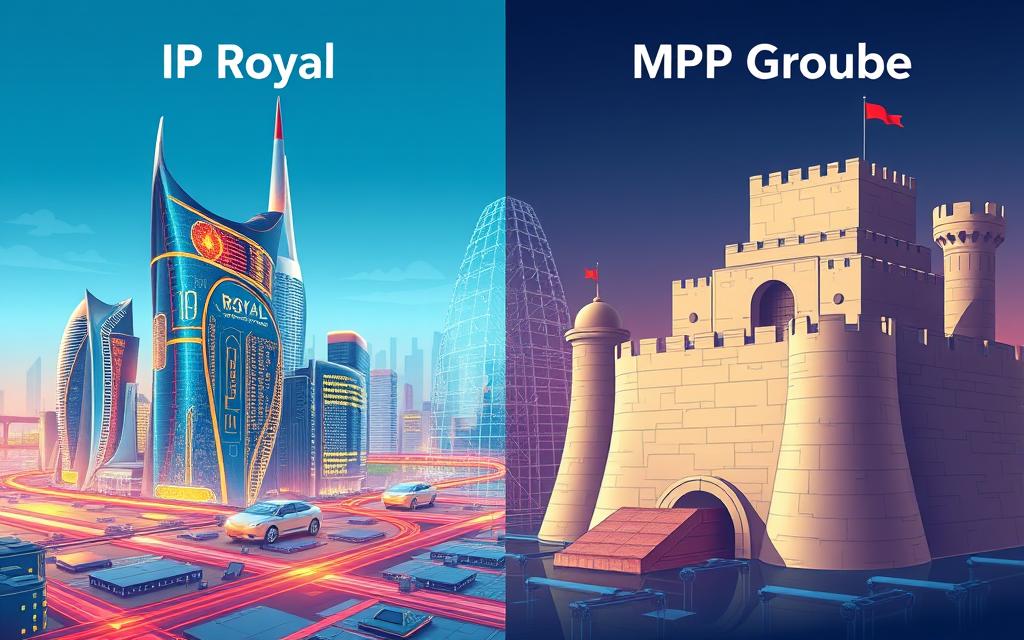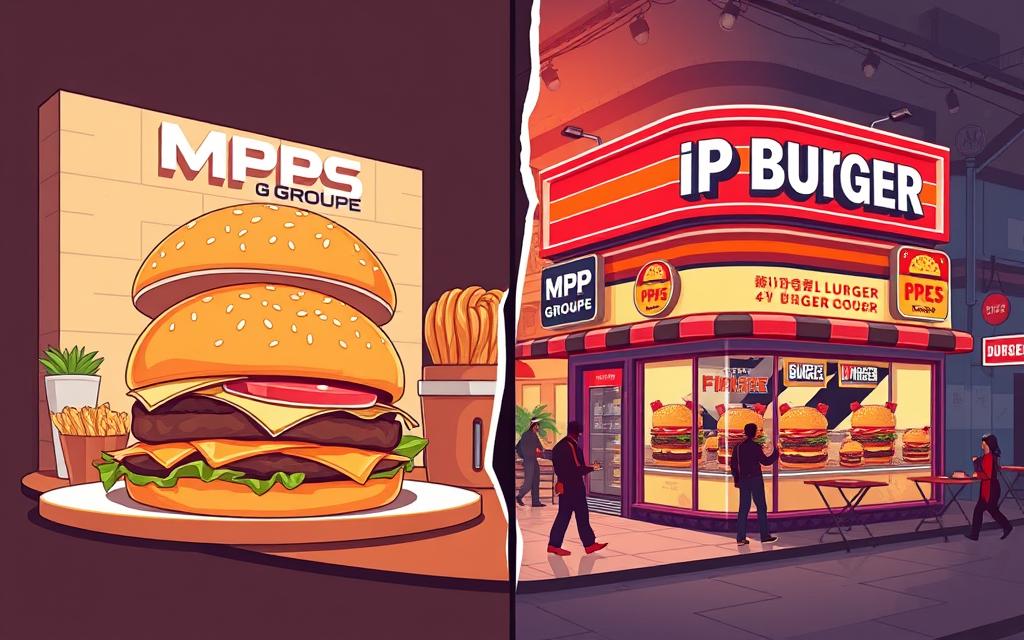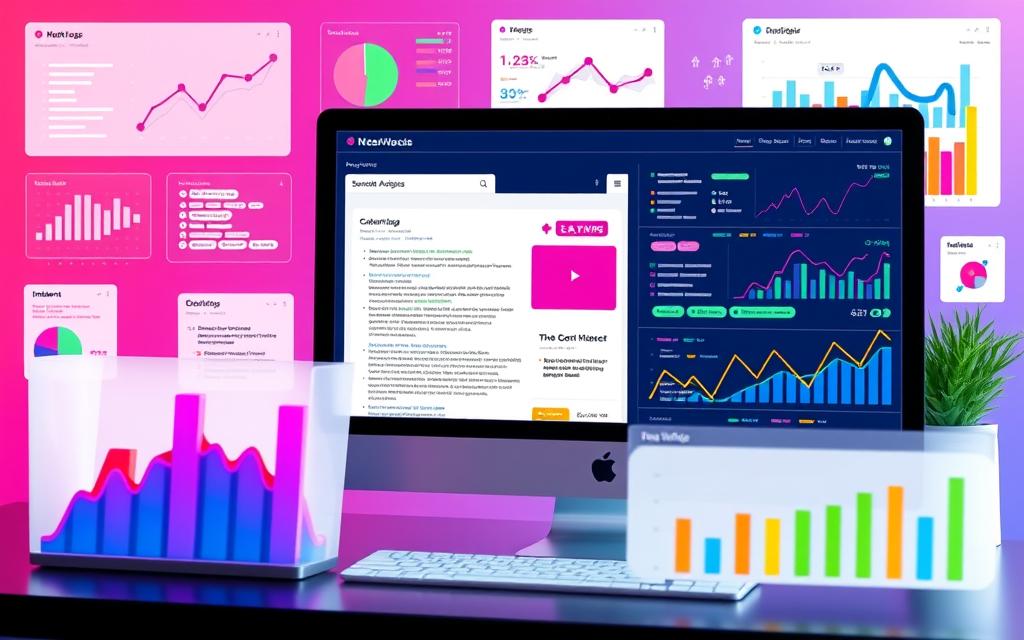In today’s digital world, keeping our online activities safe is key. Proxy servers are powerful tools that help us do just that. They act as middlemen between us and the internet. But, what makes proxy servers special, and how do they boost our online security and privacy?
This guide explores how proxy servers improve our online safety, keep our identities hidden, and let us access blocked content. We’ll cover the basics and the different types of proxy servers. This will help you choose the right tool for your online needs.
Key Takeaways
- Proxy servers act as intermediaries between users and the internet, shielding online activities from prying eyes.
- They offer enhanced privacy and anonymity, protecting users from cyber threats and enabling access to geo-restricted content.
- Navigating the diverse types of proxy servers, such as HTTP, SOCKS, and transparent proxies, is crucial for finding the right solution.
- Careful evaluation of factors like speed, reliability, and pricing is essential when selecting a proxy server provider.
- Proxy servers can be instrumental in bypassing censorship, securing public Wi-Fi connections, and powering web scraping and data harvesting efforts.
What are Proxy Servers?
Proxy servers are computers or servers that sit between users and the internet. They add a layer of protection and privacy. They hide the user’s IP address and manage their online activities.
Definition and Purpose
A proxy server is like a middleman between your device and the web. It routes your internet traffic through its servers before it reaches its destination. This way, it can check and filter your data, making your online activities safer and more private.
How They Work
When you want to see a web page, the proxy server gets the request first. It then sends the request to the web server. The server’s response comes back to the proxy, and it sends it to you. This way, your IP address is hidden, giving you more privacy and security.
Types of Proxy Servers
There are many types of proxy servers, each with its own special features. Here are a few:
- HTTP Proxies – These handle HTTP web traffic, letting you access websites and apps.
- SOCKS Proxies – SOCKS proxies work with more internet protocols, like TCP and UDP. They’re more flexible than HTTP proxies.
- Transparent Proxies – These are used by companies to watch and control what employees do online. They don’t need any special setup.
Proxy servers are key for anonymous browsing, hiding IP addresses, and boosting security and privacy online.
Benefits of Using Proxy Servers
Proxy servers offer many benefits for your online life. They boost your web privacy and protect you from cyber threats. These tools are key to keeping your digital world safe.
Enhanced Privacy and Anonymity
Using a proxy server means better privacy and anonymity. It hides your IP address and keeps your online identity secret. This makes it hard for others to track what you’re doing online, keeping your personal info safe.
Improved Security against Threats
Proxy servers also shield you from online dangers like malware and phishing. They act as a shield, blocking bad content and suspicious sites. This is super helpful when using public Wi-Fi or accessing sensitive info.
Access to Geo-Restricted Content
Proxy servers let you reach content blocked by location. Websites often limit access based on where you are. By using a proxy, you can unblock websites and enjoy more online content.
Proxy servers are cybersecurity tools that boost your web privacy. They protect you from threats and open up more digital content. By using them, you can make your online experience safer and more private.
Different Types of Proxy Servers Explained
Proxy servers are key to keeping your online activities safe and bypassing restrictions. They come in various types, each with its own benefits. Let’s dive into the main differences between HTTP, SOCKS, and transparent proxies.
HTTP Proxies
HTTP proxies are the most common. They handle HTTP and HTTPS traffic, making them great for web browsing. They add an extra layer of privacy and security by forwarding your web requests through the proxy server. They’re also good for accessing blocked websites.
SOCKS Proxies
SOCKS proxies work at a lower network layer. They can handle more than just HTTP and HTTPS, including P2P apps and VoIP. They’re seen as VPN alternatives, offering more security and privacy online.
Transparent Proxies
Transparent proxies are designed to be invisible. They intercept and route your internet traffic without your knowledge. They’re often used by schools and businesses to monitor and control internet use, and to boost network security.
Knowing the differences between these proxy types is key to choosing the right one for you. Whether you want to bypass restrictions, find VPN alternatives, or ensure secure browsing, understanding each type’s features and uses will help you make the best choice.
| Proxy Type | Protocols Supported | Primary Use Cases |
|---|---|---|
| HTTP Proxy | HTTP, HTTPS | Web browsing, accessing restricted websites |
| SOCKS Proxy | TCP, UDP, P2P, VoIP | Secure internet access, bypassing firewalls, VPN alternative |
| Transparent Proxy | All internet protocols | Network security, content filtering, employee internet monitoring |
“Proxy servers are the unsung heroes of secure online browsing, offering a versatile range of solutions to enhance your privacy and access restricted content.”
How to Choose the Right Proxy Server
Choosing the right proxy server is key for secure online browsing. You might want better privacy, security, or access to blocked content. We’ll look at what to consider when picking the best proxy for you.
Factors to Consider
Before picking a proxy server, think about these important points:
- Security and Privacy: Make sure the proxy uses strong encryption and anonymity to keep your online activities safe.
- Geographic Location: The proxy’s location matters for accessing blocked content and privacy.
- Speed and Reliability: Choose a proxy known for fast and reliable service to avoid browsing problems.
- Logging Policy: Check the proxy’s logging and data policies to protect your personal info.
- Compatibility: Ensure the proxy works well with your devices and software for easy use.
Evaluating Speed and Reliability
Speed and reliability are crucial when picking a proxy server. A slow or unreliable proxy can ruin your browsing. Look for user reviews and performance tests to see how well a proxy works.
Understanding Pricing Models
Proxy server prices vary a lot, from free to paid plans. Free options might seem good, but they often have downsides like slow speeds and data logging. Think about what you need and what you’re willing to pay to find the right proxy.
By considering these factors, you can choose a proxy that balances security, speed, and cost. This will improve your online security and browsing experience.
Setting Up a Proxy Server for Browsing
Exploring the internet while keeping your web privacy and anonymous browsing can be tough. But, using a proxy server can help you hide your IP address and make your online activities safer. Here, we’ll show you how to set up a proxy server for safe and private web surfing.
Step-by-Step Installation Guide
- Pick a trustworthy proxy service that fits your needs and likes.
- Get the proxy client software from your provider and install it on your device.
- Set up your proxy in your web browser or system settings with the server address and port number.
- Check if the proxy is working right and giving you the web privacy and anonymous browsing you want.
Configuration Settings to Consider
- Proxy Type: Choose the right proxy type, like HTTP, SOCKS, or others, based on what you need.
- Server Address and Port: Make sure you have the right server address and port number from your proxy service.
- Authentication: If your proxy needs a login, enter the correct username and password.
- Bypass List: Think about making a bypass list to skip certain websites or domains from using the proxy.
By following these steps and tweaking the settings, you can set up a proxy server. This will boost your web privacy, anonymous browsing, and hide your IP address when you’re online.
Common Use Cases for Proxy Servers
Proxy servers are very useful online. They help you get around censorship and keep your browsing safe on public Wi-Fi. These tools are key in today’s digital world where privacy and access are important.
Bypassing Censorship
In places where some websites are blocked, proxy servers can help a lot. They let you bypass censorship and unblock websites. This is great for people in countries with strict internet rules or for those trying to get past work or school firewalls.
Safe Browsing on Public Wi-Fi
Public Wi-Fi spots can be risky. They might let hackers steal your data or identity. Proxy servers protect you by encrypting your internet. This keeps your personal info safe, even when you’re out and about.
Web Scraping and Data Harvesting
Proxy servers are also key for web scraping and data gathering. They help you get data from websites without being caught. This is super helpful for businesses, researchers, and anyone who needs lots of data.
| Use Case | Benefits of Proxy Servers |
|---|---|
| Bypassing Censorship | Unlocking access to restricted websites and content |
| Safe Browsing on Public Wi-Fi | Protecting your data from cyber threats on public networks |
| Web Scraping and Data Harvesting | Enabling undetected access to data from target websites |
Proxy servers open up many possibilities. They help you bypass censorship, ensure safe browsing, and support data-driven projects. By using them, you can improve your online life and control your digital space.
Potential Drawbacks of Proxy Servers
Proxy servers offer many benefits for secure browsing and privacy. But, it’s important to know their drawbacks too. Knowing these can help users choose better for their online safety and preferences.
Limitations to Consider
Proxy servers aren’t perfect for online security. They might not protect against all cyber threats. For example, they might not stop advanced malware or targeted attacks like VPNs do.
Risks of Free Proxy Services
Free proxy services seem appealing, but they’re risky. They might log your activities, sell your data, or be hacked. Using free proxies can put your online safety and privacy at risk, leading to identity theft or other cybercrimes.
Impact on Browsing Speed
Proxy servers can slow down your browsing. This is especially true if the server is far away or busy. If you need fast internet for streaming, gaming, or video calls, think about how proxy servers might affect your speed.
| Proxy Server Feature | Potential Drawback |
|---|---|
| Privacy and Anonymity | Proxy servers may not provide the same level of protection as more robust security solutions like VPNs. |
| Geo-Restriction Bypass | Proxy servers may not always be able to reliably access geo-restricted content, especially if the proxy server’s IP address is blocked or blacklisted. |
| Browsing Speed | Proxy servers can slow down internet speeds, particularly for users who require fast and reliable connections. |
Knowing the downsides of proxy servers helps users make better choices for their online safety. This ensures a safer and more enjoyable internet experience.

Proxy Servers and VPNs: What’s the Difference?
Proxy servers and virtual private networks (VPNs) are key for online privacy and security. They share similarities but differ in use, security, and cost. It’s important to understand these differences.
Usage Scenarios for Each
Proxy servers are used for tasks like bypassing content restrictions and accessing geo-blocked sites. They hide your IP address, offering some anonymity. VPNs, however, encrypt all your internet traffic. They provide a secure, private connection for any online activity.
Security Features Comparison
- Proxy servers offer basic privacy but have weaker security than VPNs.
- VPNs use strong encryption to protect your data, making them safer for activities like banking.
- Proxy servers can be vulnerable to attacks, while VPNs are designed to prevent them.
Cost Considerations
Proxy services are often cheaper or free but lack the features of VPNs. VPNs cost more but offer better security, more server locations, and performance.
| Feature | Proxy Servers | VPNs |
|---|---|---|
| Encryption | Basic level of encryption | Advanced encryption protocols |
| Security | Moderate security, potential vulnerabilities | Robust security, protection against threats |
| Cost | Lower cost or free, but may lack features | Paid subscription, but more comprehensive features |
In summary, proxy servers and VPNs both offer web privacy and security. But they differ in use, security, and cost. Users should pick the best option for their needs, whether it’s a proxy server, a VPN, or a mix of both VPN alternatives and cybersecurity tools.
Major Proxy Server Providers
Choosing a reliable proxy server provider is key for secure online browsing and anonymity. Luckily, many top services meet the needs of internet users. Let’s explore some major providers and their features.
Overview of Leading Services
ExpressVPN, NordVPN, and ProtonVPN are among the best. They offer various proxy types, from basic HTTP and SOCKS to advanced residential and datacenter proxies.
Features and Pricing Comparisons
- ExpressVPN is famous for its strong security, fast speeds, and easy use. It starts at $8.32 a month for a year.
- NordVPN has a huge network and top security. Prices start at $3.99 a month for two years.
- ProtonVPN focuses on privacy and has a free plan. Paid options start at $5 a month. It’s great for secure browsing.
Customer Support and User Experience
Choosing a provider also means looking at customer support and user experience. All mentioned services have great support and easy-to-use apps. This makes setting up and using them simple.
Choosing a proxy server depends on your needs. By comparing features, prices, and user experience, you can pick the best for secure online browsing and anonymous browsing.
Tips for Safe Proxy Server Usage
Proxy servers are getting more popular for better online security and privacy. It’s important to know how to use them safely. By following these tips, you can get the most out of proxy servers while staying safe.
Best Practices for Secure Browsing
- Choose a reliable and trustworthy proxy service to hide your IP. Stay away from free or untested proxies, as they can be risky.
- Make sure your proxy settings are current and your browser is set up right. This ensures your traffic goes through the proxy server.
- Check and update your proxy server’s settings often. This helps fix security problems or performance issues.
- Use extra security like a Virtual Private Network (VPN) to boost your privacy and security even more when using a proxy.
Recognizing Signs of a Compromised Proxy
It’s key to watch for signs that your proxy server might be at risk. Look out for these signs:
- Noticeably slower browsing or more delays when using the proxy.
- Any suspicious activity, like unauthorized access or unexpected changes to your proxy settings.
- Can’t access websites or services you could before using the proxy.
- Seeing unwanted pop-ups, ads, or other content while browsing.
If you see any of these problems, stop using the proxy right away. Look for safer alternatives to protect your online security and privacy.

By sticking to these best practices and watching for proxy issues, you can enjoy proxy servers safely. Remember, your online safety is crucial. Take steps to protect yourself when you’re online.
Future Trends in Proxy Servers
Proxy servers are becoming more important as our digital world grows. New tech in proxy servers is making web privacy and security better.
Innovations in Proxy Technology
The proxy server world is seeing big tech leaps. These leaps are making these tools better at keeping us safe online. Some key changes include:
- Stronger encryption to stop snooping and data theft.
- AI and machine learning to fight off new cyber threats fast.
- Decentralized proxy networks using blockchain for safer browsing.
- Multi-hop proxy setups to hide online activities even more.
The Role of Proxy Servers in Web Privacy
Proxy servers are key in keeping our online lives private. They help protect our digital selves and keep our info safe. With more rules on data privacy, we’ll see more use of proxy servers.
| Proxy Server Feature | Benefit for Web Privacy |
|---|---|
| IP Address Masking | Hides our real IP, stopping tracking and location checks. |
| Encrypted Connections | Keeps our data safe from hackers, ensuring private chats. |
| Decentralized Architecture | Makes it tough to track us by spreading our data across many servers. |
As we want to browse safely and privately more, proxy servers are set to shine. These tools will help us surf the web with peace of mind and control.
Conclusion: Elevate Your Online Security with Proxy Servers
Proxy servers are a strong tool for better online security and privacy. They act as a middleman between your device and the internet. This helps protect your identity and data, and lets you access content blocked in your area.
Final Thoughts and Recommendations
Proxy servers are great for many things like avoiding censorship, keeping safe on public Wi-Fi, or web scraping. When choosing a proxy, think about speed, privacy, and cost. This ensures you get a service that fits your needs.
Encouragement to Explore Options
We suggest looking into different proxy server providers. Check their features to find the best one for you. By securing your online activities, you can protect your privacy and explore the internet safely. Begin your journey to a safer online world today.








Leave a Reply